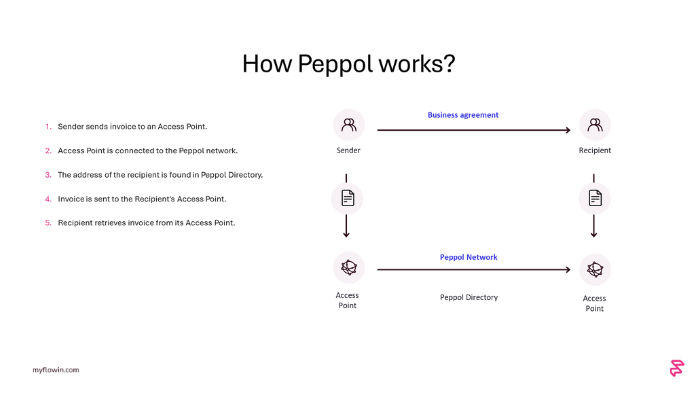Peppol is a highly-secure, open e-delivery network for exchanging electronic documents. Providing a common infrastructure and standards for cross-border commerce, Peppol has become the world’s most popular and reliable network for e-invoicing.
Any organisation make use of the Peppol network. But doing so requires correct preparation of documents for sending, a means of processing received documents, and authorised connection into the network via a Peppol Access Point.
What is a Peppol Access Point?
A Peppol Access Point is a gateway into the Peppol e-delivery network which enables various parties to send and receive documents via its four-corner model. Once connected into Peppol via an Access Point, organisations can securely exchange standardised electronic documents with any other participant who is also connected into the network.
Peppol-four corner model

Why do software companies need a Peppol Access Point?
The Peppol network has become increasingly important for companies dealing with e-invoicing and e-procurement. As well as making these processes more efficient and secure, Peppol is highly likely to become a necessity in the EU for compliance with upcoming e-invoicing legislation.
Learn more: Is e-invoicing mandatory in Europe?
Any software company that facilitates the exchange of electronic documents – especially invoices – for their clients therefore needs to be seriously looking at Peppol. And connecting into Peppol means having a Peppol Access Point.
Can a software company serve multiple clients via a single Peppol Access Point?
A software company only needs one Peppol Access Point to serve all their individual clients. This is because each client is assigned its own unique Peppol ID, which ensures documents are routed to the correct recipient. The software company’s Access Point manages this routing using the Peppol . The implementation of robust security measures like encryption and authentication will ensure each client’s data remains private and documents are only accessible by the intended parties.
Because all of the software company’s clients share the same infrastructure to connect into Peppol, this service can be offered cost-effectively and efficiently. A Peppol Access Point can scale to handle document exchange for a large number of clients, without requiring major changes.
Each user can integrate with the Peppol Access Point through an API, a web interface, or a direct connection to their ERP/accounting systems. The Access Point then handles the transmission of their documents to and from the Peppol network.
What is a Peppol Access Point Provider?
Peppol Access Point Providers are certified organisations or service providers that operate a Peppol Access Point, which can be used to connect to the Peppol network. Software companies can work with a Peppol Access Point Provider to deliver Peppol connectivity to their own users, instead of having to build and maintain their own Access Point.
A Peppol Access Point Provider
- helps businesses register on the Peppol network and obtain their unique ID
- ensures documents are transmitted securely and conform to Peppol standards (including syntax and formatting rules)
- verifies sender and recipient identities to prevent fraud and unauthorised network access
- handles the complexities of different systems and to ensure interoperability
- handles routing and ensures each document reaches the recipient’s Access Point correctly
- maintains the Peppol Access Point certification
Is it better to build your own Peppol Access Point, or use a Peppol Access Point Provider?
Using an Access Point Provider enables a software company to deliver all Peppol access benefits to their customers, without having to invest in developing, certifying and maintaining the Access Point.
Building and implementing your own Peppol Access Point can be done in a bare minimum of three months, but is more likely to take upwards of (plus another year to develop a compliant API).
Development and Setup: building the infrastructure to support Peppol’s document exchange protocols necessitates
- understanding Peppol standards (e.g. e-invoice formats like UBL, the four-corner model, security protocols)
- implementing secure document transmission systems such as AS4 messaging protocol
Compliance and Certification: undergoing a Peppol certification process to ensure your system complies with all technical, security and operational standards. This includes applying for approval, undergoing conformance testing with OpenPeppol, and ensuring all security requirements are met.
Ongoing maintenance: including software updates, compliance with future Peppol changes, and ensuring 24/7 uptime in line with Peppol’s 99.5% SLA.
By comparison, using a Peppol Access Point Provider can get you up and running in a couple of weeks for advanced API integration with ERP systems, while basic integration via a web portal can be done in a matter of days. All you need to do is select a provider who can meet your needs.
Learn more: 3 reasons not to develop your own Peppol access point for e-invoicing
How to choose a Peppol access point provider
When choosing a Peppol Access Point (AP) provider, software companies need to take several factors into consideration to ensure efficient, secure, and compliant electronic data exchange within the Peppol network.
Peppol certification and compliance
The provider must be certified by the Peppol Authority and stay up-to-date with Peppol changes such as document format updates, security protocols and country-specific requirements. This ensures they deliver Peppol compliance, which guarantees compatibility and interoperability.
Geographical coverage and local requirements
If a software company or its clients operate in multiple countries, the Peppol Access Point provider must support cross-border invoicing and document exchange with mandatory e-invoicing . Alongside this, they need to meet local regulatory requirements for VAT or e-invoicing mandates.
Service reliability and uptime
High reliability is critical for business continuity, especially when handling high transaction volumes. It’s important to check the provider’s service level agreements (SLAs) for are in line with Peppol requirements, as well as confirming they have a reliable infrastructure with failover mechanisms to minimise downtime in case of technical issues.
Integration capabilities
The Peppol Access Point provider should offer robust APIs that integrate easily with the software company’s solutions and be compatible with different document types (e.g. invoices, purchase ) and communication protocols). Consider whether the provider offers flexibility in terms of integration options, which allow the software to adapt to various business requirements.
Security and data protection
The provider must use strong encryption methods to secure data both in transit and at rest, and have adequate data backup and recovery systems in place in case of loss or corruption. The provider should adhere to international security standards such as ISO and, for companies operating in Europe, comply with the GDPR.
Cost structure
Check out how cost-efficient the Peppol Access Point provider’s pricing model is for your expected transaction volume and budget. Some charge per document, while others offer subscription-based plans. Check for any additional costs such as setup fees, support fees, or fees for integrating with new formats or protocols.
Support and maintenance
The Peppol Access Point provider should offer responsive and knowledgeable technical support. Evaluate whether they provide 24/7 , especially if you or your clients operate across different time zones. Also check whether they assist with Peppol onboarding and offer training to ensure a smooth integration and efficient use of the Peppol network.
Scalability and future-proofing
Can the Peppol Access Point provider scale with your business, to handle increasing transaction volumes and document types as and when necessary? Are they proactive in adopting new services, such as the upcoming Peppol BIS 4. and ViDA support, and integrating emerging technologies like blockchain or artificial intelligence?
Peppol document types and features
Check which Peppol document types (e.g. invoices, credit notes, ) and versions the provider supports, in case there are any limitations. Some providers offer extra services, such as document mapping, and archiving, which can be helpful in ensuring compliance and simplifying processes.
Learn more: How to choose the right e-invoicing API
Why is Flowin an ideal partner for Peppol access and integration?
Flowin is both a Peppol Access Point provider and an API for integration with ERP and accounting systems. This makes it a fully certified one-stop-shop for Peppol integration and e-invoicing compliance, which software companies can partner with to satisfy all their customers’ needs.
Flowin’s cross- coverage and certification meet EU specification, while having certification and complying with the GDPR.
Satisfying every requirement and desire when it comes to Peppol access and integration, Flowin offers a well-documented, easy-to-implement API with a uniquely cost-efficient pricing model
